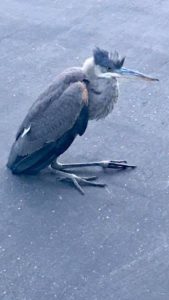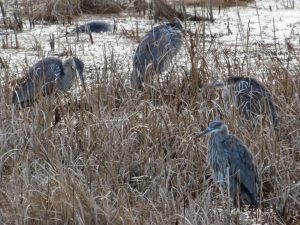December 21, 2018 at 10:06 am
These four juvenile Great Blue Herons were spotted in Damariscotta on December 6th. The photographer, Stacey Keefer, said there was also a fifth with this bunch.
There is a small portion of our Great Blue Heron population that overwinters in Maine, but all those I have seen or heard about are juveniles. Quite often those that stay are not in great condition and may even be starving. A juvenile great blue heron captured accidentally by a beaver trapper this November was not injured in the process but was brought to Avian Haven - one of Maine’s top-notch bird rehabilitators - because it was noticeably thin. After several days of nourishment, it was ready to release, however, it died in transit to the release site. A necropsy revealed an enlarged liver, something that was not detectable at Avian Haven through routine examination and radiographs. Recently, a juvenile Great Blue Heron was reported in Topsham that visibly seemed ill or injured. The photo of this bird on the Maine Birds Facebook page drew a lot of comments out of concern for the bird. Most everyone referred the person to Avian Haven. This was the correct thing to do and Avian Haven and their volunteers did get involved, but what should you do while waiting for a response from an expert? I thought it may be worthwhile to outline what should be done when an ill or injured heron is spotted. By following these recommendations, you may be able to save the bird and yourself from personal injury:
- First, you need to read the following page on Avian Haven’s website: I found a bird. Now what do I do?
- Call a wildlife rehabilitator, wildlife biologist, or warden. MDIFW maintains a list of wildlife rehabilitators in Maine. The two most prominent rehabilitation facilities that deal with birds are Avian Haven in Freedom and Center for Wildlife in Cape Neddick. MDIFW biologists and game wardens can be reached by contacting the nearest regional office.

This is a very sick or injured juvenile Great Blue Heron, photographed by Lynn Sirois in Topsham on December 15th.
- While you are waiting for a response from a rehabilitator, here are some things to remember about herons:
- Keep in mind that this is a bird that can be very dangerous! Despite an individual’s appearance as sick, injured, or weak, it is a wild animal that may still be able to muster up its defenses when approached. A great blue heron’s most powerful defense is its beak. It can and will strike at you with it. They will often go after moving objects, such as your eye. Do not attempt to capture it without FIRST SPEAKING WITH someone who is trained to do so, such as a rehabilitator, biologist, or warden.
- Great blue herons are carnivores/piscivores (meat and fish eaters). They do not eat bird seed. Do not attempt to give the bird food or water. While it may seem like it would help to throw a few sardines in front of it, there is a reason the bird is in its current state, and the rehabilitator will determine that reason and the best remedy.
- Follow the instructions of the wildlife rehabilitator (or biologist or warden).
- Once you have SPOKEN with a wildlife rehabilitator, biologist, or warden and are instructed to capture the bird, be sure to have a container ready for it. A great blue heron stands about 3 feet tall. You can use a cardboard box or pet carrier that is at least 1.5 feet tall (taller is better). If using a cardboard box, be sure there are air holes. Place a clean soft cloth in the bottom. To capture the bird, you should put a sheet over it first then firmly grab hold of its beak (while it is under the sheet). DO NOT let go of the beak until the bird is secure in your prepared container. It is always best to have a second person to help handle a heron – one person dedicated to handling the beak while the other holds the bird’s body (wings folded and gently secured against the body). Once the bird is contained, keep the box closed so the bird cannot escape and in a quiet place away from people and pets. The bird will be stressed by your presence and sound, but darkness and quiet can help alleviate that stress.
- Always wash your hands and anything that was in contact with bird.
- Keep in mind that this is a bird that can be very dangerous! Despite an individual’s appearance as sick, injured, or weak, it is a wild animal that may still be able to muster up its defenses when approached. A great blue heron’s most powerful defense is its beak. It can and will strike at you with it. They will often go after moving objects, such as your eye. Do not attempt to capture it without FIRST SPEAKING WITH someone who is trained to do so, such as a rehabilitator, biologist, or warden.
By following the guidelines above, as well as those outlined by the rehabilitator, the bird has the best chance of recovery, and you have the best chance of avoiding an injury.
